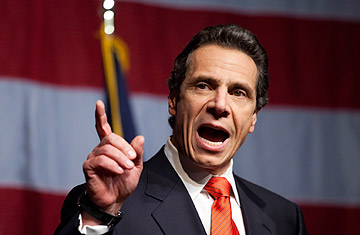
"We just won an election," labor boss Andy Stern crowed two years ago, at about the time Barack Obama was taking the oath of office and the union movement was giving itself the lion's share of the credit for getting him there. After spending some $450 million to elect Obama and a supporting cast of Democrats, labor was calling in the chits: universal health care, higher taxes on the wealthy and so-called card-check voting rules to make it easier to unionize private employers.
For the latest reminder that two years is forever in politics, look how the mighty have fallen. The movement got only part of what it wanted from health care reform. On taxes and card check, zip. And across the country, new leaders are being sworn in to office with decidedly antiunion plans.
Formerly friendly Wisconsin has a new governor, Republican Scott Walker, who is promising to use "every legal means" to weaken the bargaining power of state workers — including decertification of the public employees' union. Ohio's new governor, Republican John Kasich, wants to end the rule that requires nonunion contractors to pay union wages, and he's targeting the right of public employees to strike. Indiana legislators talk of making their state — once a bastion of unionized manufacturing — a Midwestern right-to-work redoubt.
Even in places where Democrats cling to power, unions are under the gun. New York's incoming governor, Andrew Cuomo — son of the labor darling Mario Cuomo — intends to freeze the salaries of the state's 190,000 government workers and has promised to cinch the budget belt tighter when public union contracts are renegotiated this year. In California, new governor Jerry Brown — who gave public employees the right to unionize when he was governor in the 1970s — returns to his old post talking darkly about the unsustainable drain that union pensions and health benefits are on the state's budget.
What changed? You could turn Stern's words back on him. Labor just lost an election, swamped by the Republican tide. But even more damaging is the hangover from the financial crash of 2008. Though stock prices have largely rebounded, the crisis laid bare the absurdly rosy scenarios that propped up the pension plans of public employees. Now governments at every level — federal, state and local — are under extraordinary pressure to balance their books.
The gleam in labor's eye two years ago turned out to be the light from an onrushing train.
